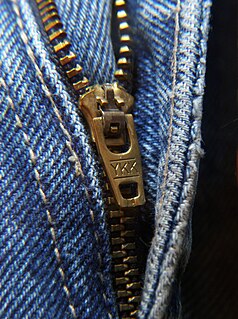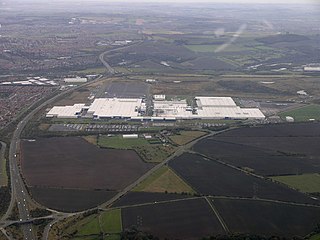Related Research Articles

Kawasaki Heavy Industries Ltd. (KHI) is a Japanese public multinational corporation manufacturer of motorcycles, engines, heavy equipment, aerospace and defense equipment, rolling stock and ships, headquartered in Chūō, Kobe and Minato, Tokyo, Japan. It is also active in the production of industrial robots, gas turbines, pumps, boilers and other industrial products. The company is named after its founder Shōzō Kawasaki. KHI is known as one of the three major heavy industrial manufacturers of Japan, alongside Mitsubishi Heavy Industries and IHI. Prior to the Second World War, KHI was part of the Kobe Kawasaki zaibatsu, which included Kawasaki Steel and Kawasaki Kisen. After the conflict, KHI became part of the DKB Group (keiretsu).

The YKK Group is a Japanese group of manufacturing companies. As the world's largest zipper manufacturer, YKK Group is most known for making zippers. It also manufactures other fastening products, architectural products, plastic hardware and industrial machinery.
Foreign trade played an important role in the national economy of Communist Czechoslovakia as opposed to the economic system of the Soviet Union.

The Australian Manufacturing Workers Union (AMWU), or more fully the Automotive, Food, Metals, Engineering, Printing and Kindred Industries Union, is an Australian trade union. The AMWU represents a broad range of workers in the manufacturing sector, as well as associated industries, and is affiliated to the Australian Council of Trade Unions.
During the Empire of Japan and up to 1945, Japan was dependent on imported foods and raw materials for industry. At the time, Japan had one of the largest merchant fleets in the world with a total of approximately 6 million tonnes of displacement before December 1941. Despite heavy naval losses during the Pacific War, Japan was still left with 4,700,000 tonnes.
This article covers the development of the industry in the Empire of Japan, during the rise of statism in the first part of the Shōwa era.

Nissan Motor Manufacturing (UK) Ltd (NMUK) is a car manufacturing plant in Sunderland. It is owned and operated by the European division of Japanese car manufacturer Nissan.

The American Precision Museum is located in the renovated 1846 Robbins & Lawrence factory on South Main Street in Windsor, Vermont. The building is said to be the first U.S. factory at which precision interchangeable parts were made, giving birth to the precision machine tool industry. In recognition of this history, the building was declared a National Historic Landmark in 1966. In 1987, the building was recognized by the American Society of Mechanical Engineers as an International Heritage Site, and the collection was recognized as an International Heritage Collection. For each of these designations, the armory was considered a site where pivotal events occurred in the history of American industry, as well as a place that lends itself to comprehensive interpretation of that history.
The Sheet Metal Workers' International Association was a trade union of skilled metal workers who perform architectural sheet metal work, fabricate and install heating and air conditioning work, shipbuilding, appliance construction, heater and boiler construction, precision and specialty parts manufacture, and a variety of other jobs involving sheet metal. On August 11, 2014, it merged with the United Transportation Union (UTU) to form the International Association of Sheet Metal, Air, Rail and Transportation Workers, known by the acronym, SMART.

Howard & Bullough was a firm of textile machine manufacturers in Accrington, Lancashire. The company was the world's major manufacturer of power looms in the 1860s.
Honda of the UK Manufacturing Ltd was a British automotive manufacturing company, and the United Kingdom-based manufacturing subsidiary of the multinational automotive company Honda. Based in Swindon, England, HUKM operated manufacturing plants that included casting, engine assembly, pressing, welding, painting, and car assembly activities. At the time of its closure, it employed around 3,400 people at the plants, which occupied a site covering around 370 acres.
The National Union of Domestic Appliances and General Operatives (NUDAGO) was a trade union representing metal workers in the United Kingdom, principally in the town of Rotherham. It primarily represented workers employed in manufacturing whitegoods, but also had some membership in foundries and light engineering.
The Metal and Machinery Workers Industrial Union No. 440 (MMWIU) was a labor union in the United States which existed from 1907 to 1950. It organized workers in the manufacturing industry and was affiliated with the Industrial Workers of the World (IWW).
The Japanese Metal Industrial Workers' Union was a trade union representing metal engineering workers in Japan.
The National Metal and Machinery Workers' Union was a trade union representing workers in small and medium-sized engineering works in Japan.
The National Trade Union of Metal and Engineering Workers (Zenkokukinzoku) was a trade union representing machining workers in Japan.
The Japan Confederation of Shipbuilding and Engineering Workers' Unions was a trade union representing workers in manufacturing industries in Japan.
The National Machinery and Metal Workers' Union was a trade union representing factory workers in Japan.
The All Japan Metal and Machinery Information Workers' Union was a trade union representing workers involved in making metal and electronic goods.
The Japan Metal Manufacturing, Information and Telecommunication Workers' Union is a trade union representing workers in the engineering and telecommunications industries in Japan.
References
- ↑ "Half-million-strong union inaugurated". IndustriALL. Retrieved 11 November 2021.